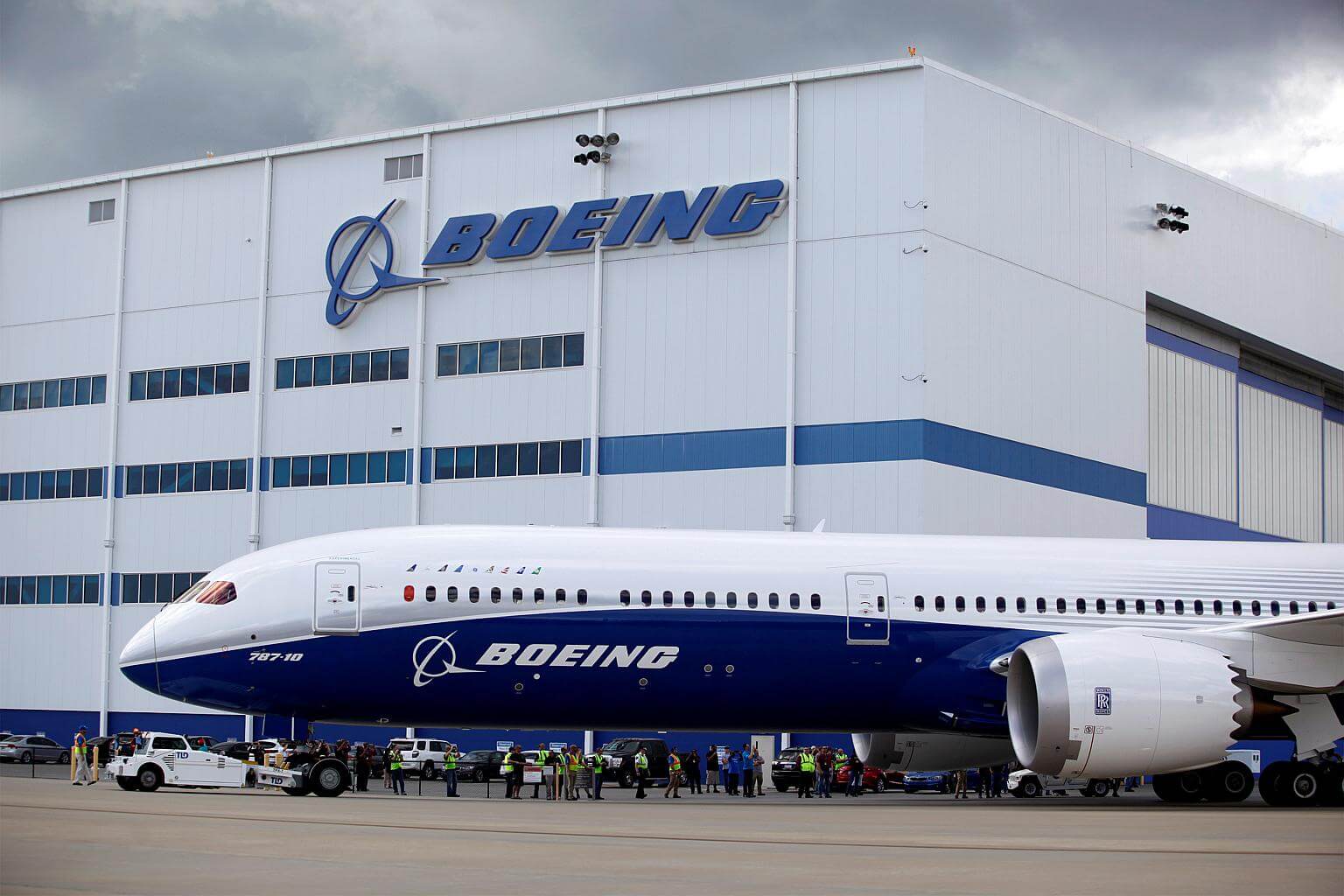In a trade war, US aviation giant Boeing could be a sitting duck
Sign up now: Get ST's newsletters delivered to your inbox

A flagship of US industry and one of the best known American brands, Boeing says it is the largest US exporter because about 80 per cent of its planes are for export.
PHOTO: REUTERS
CHARLESTON, UNITED STATES (AFP) - The sparkling new Boeing 787s bound for China Southern Airlines and Air China are waiting to be delivered, but the prospect of a trade war could make for a less rosy future.
At this Boeing manufacturing plant in Charleston, South Carolina - which President Donald Trump visited a year ago to cries of "God Bless Boeing" - the trade battle he unleashed with Beijing last week is far off.
Or so it seems. Like the company itself, workers at the plant, which produces the Boeing 787 and where unions have struggled to organise the labour force, say little when the question comes up.
But the threat of losing export markets is still clear and present.
"Unfortunately, Boeing makes an easy target for anyone wishing to retaliate against the new US trade measures," Mr Richard Aboulafia, vice-president of analysis at Teal Group, told Agence France-Presse.
A flagship of US industry and one of the best known American brands, the company says it is the largest US exporter because about 80 per cent of its planes are for export.
As a result, any trade major conflict would leave the company dangerously exposed - in particular one involving the world's fastest growing aviation market in China.
Boeing was one of the first companies Mr Trump attacked on Twitter, when he threatened to cancel an order for a new presidential plane he said was too expensive.
The company has managed to work its way back into the president's good graces, with its share price up 129 per cent since the election in November 2016.
But since peaking in February, Boeing's shares are down more than 10 per cent as investors consider the company's prospects in the new trade environment Mr Trump has created.
At least in the short term, the company has little to fear, with a healthy order portfolio of 5,864 planes, meaning it will be in constant production through 2024.
Furthermore, China, where air travel is booming, can scarcely afford to push its partly state-owned domestic carriers to cancel their orders or boycott the US manufacturer because they simply have no alternative, experts say.
The Chinese manufacturer Comac, which soon hopes to market its C919 - a potential competitor to the mid-range Boeing 737 and Airbus A320 jets - is not yet ready for large-scale production. The plane had its first test flight in December last year (2017).
"In the best case scenario, Comac will need another five or six years to reach a respectable production capacity," said Mr Michel Merluzeau, an analyst at AirInsight.
Meanwhile, Airbus, Boeing's main competitor, also has a healthy backlog of orders and its suppliers are already struggling to keep up with the speedy new pace of production.
"In the short term, China has no choice if it doesn't want to put the brakes on the growth of its air transport sector," according to Mr Merluzeau.
Boeing is also due to open a new finishing centre for its medium-range 737 jets in Zhoushan, south of Shanghai, this year. And Beijing will certainly do nothing to jeopardise that, added Mr Merluzeau.
When Boeing considers the longer term, however, its grounds for self-confidence become shakier.
Mr Scott Hamilton, managing director at aviation consultants Leeham Company, said China can use industrial orders for political messaging.
"If China were to retaliate against Boeing, it would more likely be in freezing new orders for an indefinite time, placing them with rival Airbus instead," he told AFP.
Agreeing, Mr Aboulafia of Teal Group said: "A few large block orders for Airbus would send a strong message, particularly if China abstains from any Boeing orders for some time."
Between January 2016 and the start of this year, China accounted for a fifth of all Boeing's deliveries, or 303 out of 1511 aircraft received by commercial air carriers, according to the company's figures.
The company's order backlog also shows China's share of Boeing deliveries set to grow, analysts say.
Furthermore, Beijing could frustrate Boeing's plans to expand into the so-called mid-market by introducing a new jet in the 220-to-260-seat range, an industry segment where Airbus currently has a head start.
"Chinese air carriers would only have to place a few large orders of A330-800neo and A321neo jets to hurt the newer aircraft's potential," said Mr Merluzeau of AirInsight.
Other countries in addition to China could also retaliate against Boeing because of Mr Trump's promised new tariffs.
Brazil, for example, could block Boeing's efforts to form a commercial jet joint venture with the Brazilian aircraft manufacturer Embraer.


